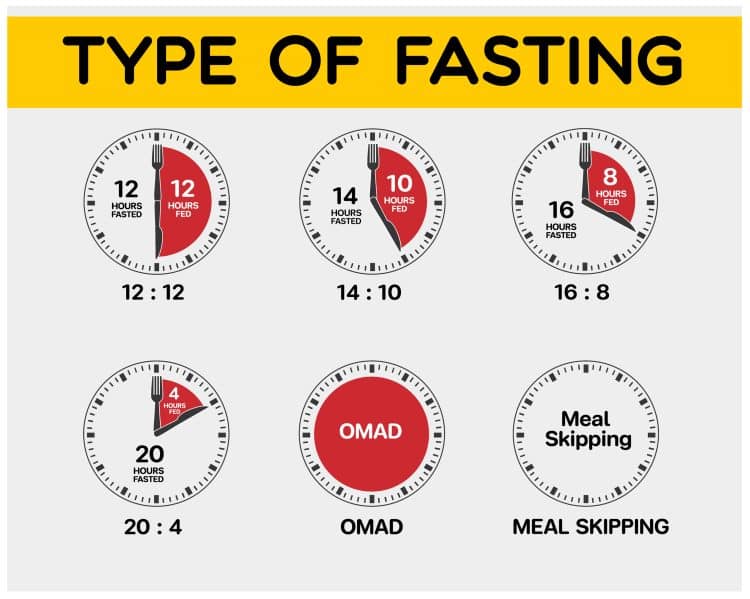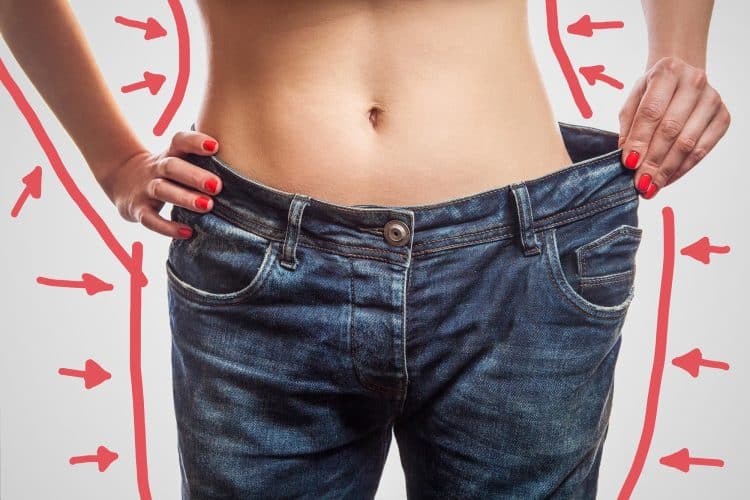Intermittent fasting has become a buzzword in the health and fitness industry, and for a good reason. This eating pattern, which alternates between periods of fasting and eating, has been linked to a host of benefits, from weight loss and improved blood sugar control to lower inflammation levels and a reduced risk of chronic diseases.
However, the variety of intermittent fasting programs makes finding the right IF protocol difficult. Enter the 12/12 intermittent fasting method. This popular fasting protocol is simple, flexible, and easy to follow, making it an excellent option for beginners and seasoned fasters. In this article, we’ll give you the lowdown on everything you need to know about the 12/12 intermittent fasting method, so you can decide if it is the right approach for you.
What is Intermittent Fasting?
Intermittent fasting involves fasting for a certain number of hours and consuming calories in the remaining hours. There are several intermittent fasting programs, some of which are:
- 16/8 Intermittent fasting: In 16/8 intermittent fasting, you fast for 16 hours and eat in the remaining eight hours.
- OMAD Intermittent fasting: OMAD stands for one meal a day. With this type of fasting, you fast for 23 hours of the day and consume your calories in the remaining one-hour feeding window.
- 5/2 Intermittent fasting: In 5/2 intermittent fasting, you will eat normally five days a week and restrict your calorie intake to 500-600 calories on two non-consecutive fasting days.

What is the 12-Hour Fast?
The 12/12 intermittent fasting method is ideal when it comes to fasting for weight loss as well as other benefits. It requires you to fast for 12 hours of the day and consume all your meals, including snacks, in the remaining 12-hour eating window.
The 12-hour fasts are a highly flexible eating method and are one of the best ways to achieve weight loss. The calorie deficit ramps up your metabolism, enabling you to burn fat cells for energy at the best possible rate. [1]
The process by which the body starts to burn its fat reserves for fuel is known as ketosis, and it begins when your body goes without food for a minimum period of 10-12 hours [2]. After this period, ketones are released, allowing your body’s metabolism to switch from glucose to fat as a fuel source.
Health Benefits of 12/12 Intermittent Fasting
Besides its weight loss advantages, most people are drawn to intermittent fasting because of its several health benefits, which include:
Weight Loss
As we mentioned, if you go without food for 12 hours, your body produces ketones, shifting it into fat-burning mode. This is one of the integral stages of intermittent fasting as well as fat loss.
The 12-hour fasting period will allow your body to switch from burning glycogen (blood sugar) to using your reserve fat stores as a fuel source. As you may have expected, this method is one of the better ways to burn body fat. Most practitioners will experience weight loss much quicker with 12/12 intermittent fasting than with other dieting protocols.

Brain Health Improvement
Tapping into your fat reserves for energy production is a wonderful way to boost mental clarity and help with mental health issues. Fasting enhances brain health, leading to much lower rates of cognitive decline and even reducing brain damage after a stroke. [3]
Fasting increases the BDNF hormone in the brain. BDNF is responsible for the production and renewal of nerve cells and has been linked to decreasing the chances of neurological diseases like Alzheimer’s and Parkinson’s.
Reduction in Inflammation
Another essential benefit of the 12-hour fast is its ability to reduce inflammation, which can lead to cardiovascular disease, diabetes, and cancer. Research has shown that periods of fasting followed by eating windows consisting of healthy foods decrease inflammation in the body. [4]
Improvement in Heart Health
Insulin resistance, high blood triglycerides, high blood sugar, LDL cholesterol, and inflammation increase the risk of heart disease. According to studies, these risk factors are significantly reduced with intermittent fasting. [5]
Longevity
Studies have shown that long periods of fasting, like 12/12 intermittent fasting, enhance circadian autophagy, directly increasing lifespan. Autophagy is the process that renews and recycles our body’s cells. [6]
Reduced Insulin Resistance
When you do 12/12 intermittent fasting, your insulin resistance will decrease. Blood sugar levels decrease by 3-6%, and fasting insulin levels drop by 20-31%. This directly connects with reducing the risk of contracting type 2 diabetes. [7]
May Prevent Cancer
Many animal studies have shown that intermittent fasting may help prevent cancer. Human trials are not out yet, but there is reason to be hopeful.
12-Hour Fasting Rules
12/12 Fasting is one of the easiest fasting methods, and it is ideal for beginners and those with busy schedules. The main advantage of 12-hour fasting is that you spend most of your fasting hours asleep. Thus, hunger pangs and food cravings are not felt.
You must finish your meals, including snacks before the 12-hour fasting window begins. You are free to have breakfast, lunch, and dinner, along with snacks, as needed, in your 12-hour feeding window.
If, for example, your eating window is from 8 AM to 8 PM, you should have breakfast at 8 AM, lunch at noon, some snacks if you need them, and finish dinner by 8 PM. After that, you will fast from 8 PM to 8 AM the following day, and so on. You will initially experience cravings and hunger pangs, but these will subside over time as you get used to your new eating regime.
It is better to schedule your 12-hour fasting time for the night. With this, you can have a full and satiating dinner by 8 PM and go to sleep in an hour or two. You will be sleeping for most of your fasting time, and when you wake up in the morning, you can have a satisfying breakfast at 8 AM.
Can 12/12 Fasting Help You Lose Weight?
It is possible to lose weight with 12/12 intermittent fasting. However, the weight you lose will depend on your physical activity level and diet.

You must enter a calorie deficit to lose weight. A calorie deficit is a metabolic state where you burn more calories than you consume daily. It results in your body burning fat stores to meet its energy demands. You must create a calorie deficit to lose weight with 12/12 intermittent fasting.
If you can cut 500 calories a day, the resulting calorie deficit will help you lose 1-2 pounds of weight weekly. So, you should cut 3,500 calories weekly to achieve a weight loss of 1-2 pounds at the end of the week.
Initial weight loss will be water weight, but when you persevere with this 12/12 IF, fat loss will kick in after two weeks, and once it does, you will see inches of fat disappearing from your waistline, which can be very satisfying.
Related: Calorie Deficit Calculator
Drinks That Will Not Break Your Fast
During fasting, you are not allowed to have calorie-laden foods or drinks, as that would push you out of ketosis. However, here are some calorie-free beverages you can enjoy during your 12-hour fasting window:
Water
Water is essential for digestion, and it also helps give you a feeling of fullness during your fasting window. Also, dehydration is a common side effect of fasting, so ensure you have plenty of water regularly. Also, water has zero calories, so you can have as much as you like.
Coffee
Coffee gives you energy and also acts as an appetite suppressant. However, you can only have black, unsweetened coffee during your fasting window. Adding sugar, stevia, or cream will bring in calories, stopping the fat-burning process.

Tea
During intermittent fasting, you can have unsweetened tea without sugar or cream. Several green teas contain antioxidants that will assist you in burning calories.
Lemon Water
Lemon water is one of the best refreshers, and as long as you do not add sugar, it will not have the sufficient calories required to break a fast. But stay away from packaged lemon drinks with sugar and added calories, as that will break your fast.
Best Foods To Break Your 12-Hour Fast
After the fasting time is over, it is vital to have the right foods to maintain your weight loss success. Do not eat refined sugars or processed foods; avoid large meals right after your fast ends.
Some of the best foods to break your fast with are protein-rich, fresh, and rich in complex carbs and fats.
You can break your fast with foods such as the following:
- Light foods like smoothies, yogurt, and eggs.
- Salads that have lean protein, like chicken and fish.
- Soup with fibrous vegetables, bone broth, and protein.
- Whole grain toast with smoked salmon and nut butter.
Who Should Not Do 12/12 Intermittent Fasting?
Some people might experience intermittent fasting side effects, like fatigue, headaches, trouble sleeping, and nausea. These side effects are temporary and should disappear after you become accustomed to fasting. However, certain groups of people should abstain from intermittent fasting:
- People with a history of eating disorders
- Those below 18 years of age
- Diabetics
- Pregnant or breastfeeding women
FAQs
How long does it take for 12/12 intermittent fasting to work?
It will take your body a while to adjust to 12/12 intermittent fasting. Do not expect to see results right away. You may need to wait 2–4 weeks to see results.
What are the health benefits of 12/12 fasting?
The benefits of 12-hour fasting include improved digestion, weight loss, improved sleep, increased mental health and clarity, and reduced insulin resistance.
Should I skip breakfast or dinner during intermittent fasting?
When it comes to intermittent fasting, skipping your dinner is easier and better. You can have your dinner early or have a heavy snack before fasting.
Conclusion
Among the different intermittent fasting plans, fasting for 12 hours is the easiest way to lose weight and enjoy associated health benefits. Not only does this kick start your weight loss journey and boost your metabolism, but fasting for 12 hours is surprisingly easy, even for people with a penchant for food. By sticking to the intermittent fasting rules, you, too, can benefit from the various benefits it offers.
References
- Anton, Stephen D., et al. “Flipping the Metabolic Switch: Understanding and Applying Health Benefits of Fasting.” PubMed Central (PMC), 31 Oct. 2017.
- Collier, Roger. “Intermittent Fasting: The Science of Going Without.” PubMed Central (PMC).
- Phillips, Matthew C. L. “Fasting as a Therapy in Neurological Disease.” PubMed Central (PMC), 17 Oct. 2019.
- Alam, Iftikhar, et al. “Recurrent Circadian Fasting (RCF) Improves Blood Pressure, Biomarkers of Cardiometabolic Risk and Regulates Inflammation in Men.” PubMed Central (PMC), 19 Aug. 2019.
- Mani, Kartik, et al. “Lysosomes Mediate Benefits of Intermittent Fasting in Cardiometabolic Disease: The Janitor Is the Undercover Boss.” PubMed Central (PMC), 14 Sept. 2018.
- Alirezaei, Mehrdad, et al. “Short-term Fasting Induces Profound Neuronal Autophagy.” PubMed Central (PMC), 14 Aug. 2010.
- Kopecky Jr, J., Clarke, S. D., & Jones, P. J. (2015). Nutritional regulation of gene expression: Carbohydrate, fat and amino acid interactions. The Journal of Nutrition, 145(9), 2046-2052.


